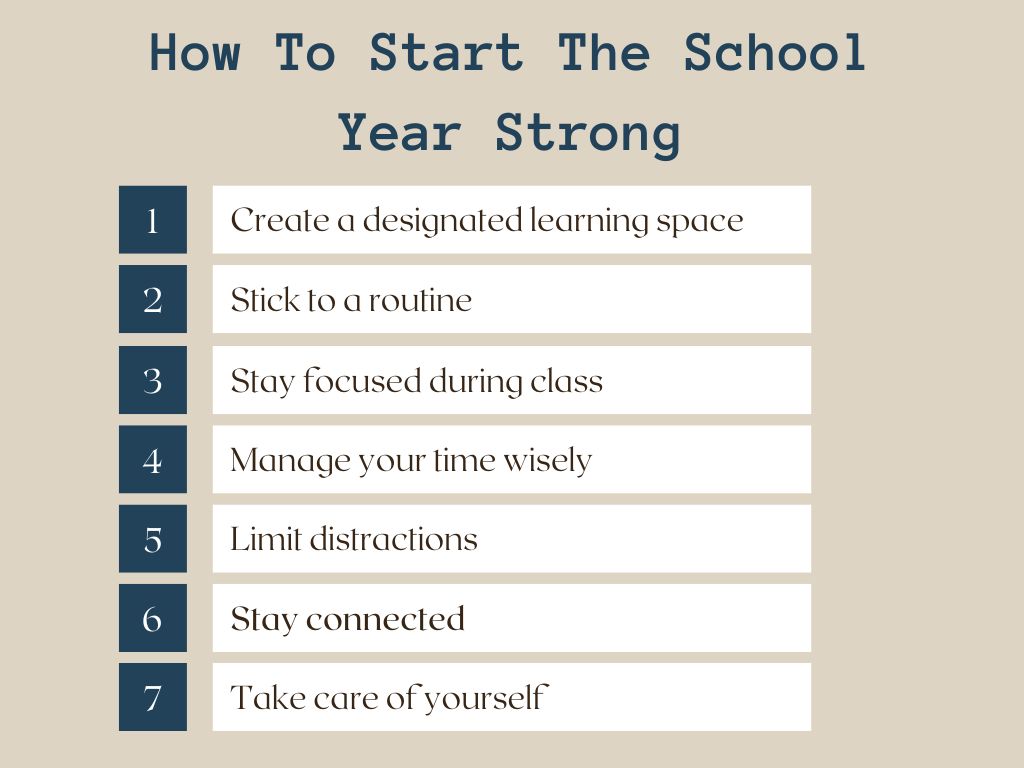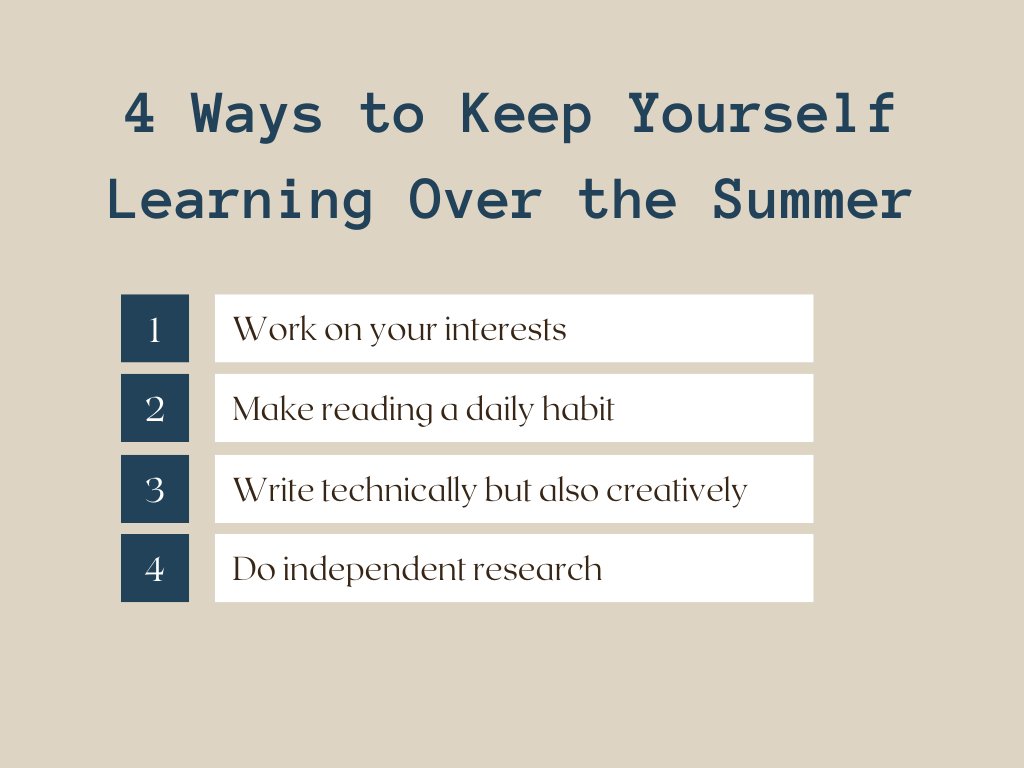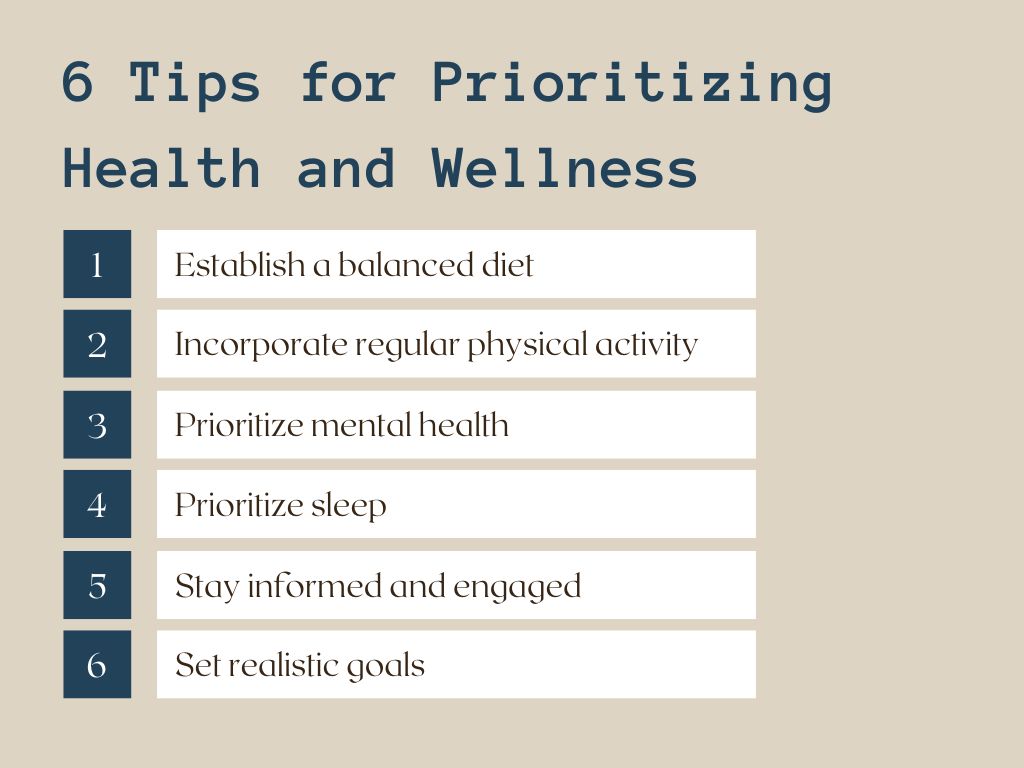Emma D., journalist
Are you the kind of student that does not look forward to having to write academic essays? If so, you might think that this type of writing requires skills that only the best writers possess. However, this could not be further from the truth. As a member of the George Washington University Online High School’s Finer Things Club, I was given the special opportunity to present a writing workshop to my school. Being a GWUOHS student for four years has given me countless opportunities to write a variety of academic essays, and as such, about a month ago, I shared my knowledge of how to approach academic writing with staff and students in a formal presentation. Now, I would like to pass on the content of my presentation to you, our GW Chronicle readers, to show you how academic writing assignments are not as hard as they seem.
General Tips
There are three points to keep in mind when composing a piece of academic writing. First, you need to think about who will be reading your essay. For instance, imagine that you are asked to write an essay that analyzes the major theme in Moby Dick by Herman Melville. If your audience consists of book lovers, it is likely that you will not need to provide many extra details about the plot of the novel. If, on the other hand, your audience consists of the general public, you must make sure that you include more plot details about the book to familiarize your readers with the content your essay is based upon. Second, all pieces of academic writing must be written using formal language and must avoid contractions and slang terms. Third, you should keep the point-of-view objective in the third person. This does not mean that you cannot offer your own ideas. All pieces of academic writing require that you analyze evidence in your own words, but when you write, do not use first-person or second-person pronouns and keep the tone neutral.
After considering those three points, it is time to begin writing. An academic essay always begins with the introduction paragraph, which consists of two main parts: the hook and the thesis statement. The hook is the very first sentence of your essay, and it draws your audience in. From a surprising statistic to a powerful quotation, there are a range of hooks you can choose from. Whatever hook you choose, make sure it feels right for your essay. The thesis statement is a direct response to your assigned prompt that uses the topics discussed in the body paragraphs. At its heart, the thesis statement is a reflection of your thoughts, and each reason supplied in support of your stance is given one body paragraph. As an example, I was one time asked to write an essay in response to the following question: In The Great Gatsby, what does the author suggest about the American Dream? Below is my thesis statement.
In The Great Gatsby, F. Scott Fitzgerald suggests that the American Dream is not as good as it seems, the people who pursue it are making bad choices to get what they want, and this pursuit is ultimately not worth it in the end and leads to dire consequences.
In my thesis statement, I list three points that I think F. Scott Fitzgerald suggests about the American Dream, and in my essay, I dedicated one body paragraph to each point. Many times, thesis statements can seem complicated, but really, all they do is answer the “Why?”.
The next portion of an academic essay is the body paragraphs, as just referred to. These form the main part of your essay. All body paragraphs consist of the same four parts: a topic sentence, evidence, analysis that ties the evidence back to the thesis statement, and another topic sentence. I will first focus on the topic sentences and analysis, and return to the evidence a little later on, since the evidence used depends on the type of essay being produced. The topic sentences are, essentially, a mini introduction and conclusion to a body paragraph. The first topic sentence builds off of the thesis statement by introducing the specific topic to be discussed in the paragraph. The last topic sentence summarizes the details discussed in the body paragraph. The analysis is where you write, in your own words, how the evidence you have used supports your thesis statement. The final part of an academic essay, the concluding paragraph, restates your thesis statement and your main points. The last sentence of this paragraph should conclude your essay in a way that connects back to your hook.
Persuasive Essay
It is important that the topic of your persuasive essay is debatable. This means that the issue you are discussing can face opposition. You can argue about a claim of fact, definition, cause, value, or policy. The two main types of evidence that are included in a persuasive essay are logos and pathos, which are derived from the Greek modes of persuasion. Logos refers to facts, statistics, examples, and expert testimony, namely in the form of quotes from experts. If you are required to conduct outside research for your essay, logos will form the foundation of your argument. Pathos is an appeal to emotion. Based on my academic writing experience, pathos is mostly present in the language of your analysis, and it comes naturally as a result of connecting your evidence to the thesis statement. Every persuasive essay also requires a counterargument, which means that you need to address a viewpoint that runs opposite to yours. At the same time, you need to address why your point of view still holds supreme. I typically approach the counterargument paragraph by acknowledging the opposing viewpoint respectfully and then explaining why my point of view is better.
Compare and Contrast Essay
A compare and contrast essay sounds exactly like what it is: a description of the similarities and differences between two topics. Compare and contrast essays also require evidence in the form of logos and pathos, but these types of essays are unique in a couple of ways. On one hand, the thesis statement of a compare and contrast essay needs to address the similarities and differences between the two topics being discussed. On the other hand, organization is a key component of a compare and contrast essay. There are two ways to organize a compare and contrast essay. You can either alternate between points of comparison and contrast per paragraph, or you can focus on one subject at a time. If you were asked write a compare and contrast essay about dogs and cats using the alternating method of organization, you would dedicate each paragraph to one point of similarity or difference between dogs and cats. If you were asked to write a compare and contrast essay about dogs and cats using the block method, you would dedicate one paragraph entirely to dogs and one paragraph entirely to cats.
Literary Analysis Essay
A literary analysis essay is very straightforward. This type of essay asks you to analyze one facet of a literary piece. In the past, most of my literary analyses revolved around explaining how the author of a book develops his or her theme. The principal thing to keep in mind about a literary analysis essay is that the evidence will only come from the piece of literature itself. As such, you will be analyzing direct quotes from the text that support your thesis statement.
Rhetorical Analysis Essay
A rhetorical analysis essay is one of the more complex academic essay genres. With a rhetorical analysis essay assignment, you will be asked to analyze how the author of a given nonfiction text develops his or her argument in the passage. The evidence for your essay will, just like the literary analysis essay, come only from the text itself, but instead of determining whether you agree or disagree with the author, you will be identifying and analyzing the rhetorical choices the author makes. Rhetorical choices include the use of logos, the use of ethos (also known as credibility), the use of pathos, organization, choice of words, sentence structure, emphasis, imagery, and figurative language.
I hope that the tips I have provided in this article will help you as you write essays for your classes. As long you follow the proper steps, you will be able to write great essays throughout your academic career!
I would like to give a special shout-out to all of my GWUOHS teachers over the years, especially Mrs. Prim and Mr. Humphrey, my English teachers. Without your instruction, I would never have been able to learn how to write great academic essays. Thank you!



